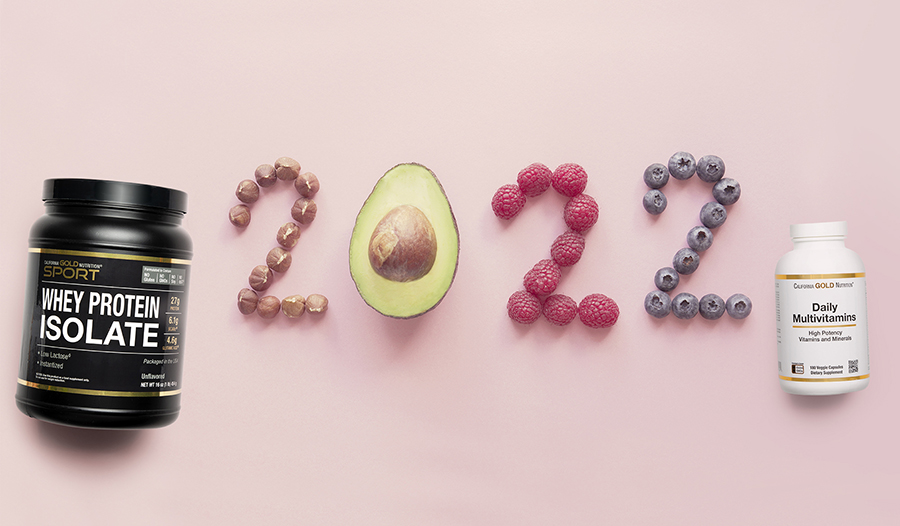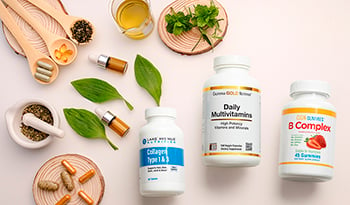10 Tips To Be Your Healthiest Self in 2022
DISCLAIMER:This blog does not intend to provide diagnosis...
- In this article:
- 1. Use the Power of Why
- 2. Be Committed to Making Healthier Choices
- 3. Have a Plan
- 4. Commit to a Healthy Lifestyle
- 5. Eat to Promote Health
- 6. Stay Well-Hydrated
- 7. Take Your Dietary Supplements
- 8. Get a Good Night's Sleep
- 9. Manage Stress
- 10. Reflect Daily With Framing Questions

Setting your sights on improving your health over the next year in one fashion or another is a common resolution. It sounds like it should be accessible no matter the specific health goal, right? Maybe you finally want to achieve your ideal body composition or have a healthy immune system. But why do most people fail to stay true to their resolutions and health goals?
As a physician for over 35 years, I have found that most patients know what they need to do and have a plan that could work, but they don't stay on it or sabotage it. So, it is not about telling them what to do per se, but instead helping them actually to do it.
Now, seeing a patient who is desperately ill is a different story. The worse the prognosis, the greater the motivation and compliance to be healthier. However, in generally healthy people, the truth is that too often, they wait until their health is in danger before realizing what a cherished gift good health is. Many people are comfortable with covering up symptoms or using short-term approaches that do not support long-term health. But that approach ultimately fails.
If a generally healthy person wants to achieve a higher level of health and wellness, they must create the same leverage that a person has when they have no other choice because their life depends upon it. The ten tips provided here are a mix of why, how, and what to do to achieve a healthier version of yourself over the next year. And you know what, I have used these same tips myself over my lifetime.
1. Use the Power of Why
To create a healthier life in 2022, answer the simple question: "Why do you want to be your healthiest self this year?"
You may have hundreds of reasons, but it is essential to create clarity in your life by making a top ten list of these reasons and writing it down. And you may also want to post it somewhere that you can see it every day. To help you out with some ideas here is mine:
- To better fulfill my mission and purpose in life.
- To fully express gratitude and my love for the experience I have been given in this life.
- To be an inspiration to my children and others.
- To more fully enjoy life and the wonder that it brings.
- To be congruent as being my healthiest self has become part of my identity.
- To share more love and connection with those close to me.
- To delay the pain of my loss of health or life until it is much later in my children's lives.
- To have more energy to give more, be more, and experience more in life.
- To fuel higher levels of self-esteem, self-confidence, and self-love.
- I am passionate about self-actualization and my legacy.
Once you know why you want to be the healthiest version of yourself, the next step is HOW. And that is a more straightforward step if you associate your reasons why.
2. Be Committed to Making Healthier Choices
Good health ultimately comes down to making good choices in your life. A choice results in an outcome. If your desired outcome is to be healthier, then your choices in ALL aspects of your life must align with this goal. Before choosing, ask, "Does this choice support my goal to be the healthiest version of myself?" If the answer is no, find and decide where the answer is yes.
3. Have a Plan
A plan is like a compass. If you don't have a plan, you will likely not get where you want to go. When optimizing our health, it is critical to put some planning into all areas – diet, lifestyle, exercise, sleep, supplementation, etc. Since food is such a crucial factor in health, definitely put some time into planning your meals and calorie intake each day. It is harder to stay on track with healthy eating if/when you feel hungry. With a bit of planning, you can avoid that.
Meal planning is neither difficult nor time-consuming. Even the busiest people can find that time to do a bit of planning and add some structure to their eating habits. You can do it in 20 minutes for the entire week, or you can do it before you go to bed for the next day. A simple menu plan with breakfast, lunch, dinner and healthy snacks is not a burdensome chore. Could you write it down, commit to it, and do it? Doing it for the whole week may make the most sense because you can then create a grocery list.
4. Commit to a Healthy Lifestyle
A health-promoting lifestyle is a critical component of being the healthiest version of yourself. Unhealthy lifestyle choices must be avoided, such as smoking, doing recreational drugs, drinking alcohol beyond moderation, etc. On the flip side, engaging in physical exercise, regular meditation, getting enough sleep, engaging in positive social situations, and enjoying positive relationships are all a part of a healthy lifestyle.
For many, the challenge is committing to a regular exercise program. One of the keys to successfully starting and keeping with an exercise program is to identify your barriers to exercise and then find creative solutions to overcome these barriers.
Rather than making excuses, find a way to overcome these obstacles and make exercise a daily commitment. It helps if you select an exercise routine that you would enjoy. The key to getting the maximum benefit from exercise is making it enjoyable and doing it often with a high enough intensity. If you can enjoy the activity, you are much more likely to exercise regularly.
Get a workout partner or join a workout class. Commit to doing one activity a day for at least 20 minutes and preferably an hour. Make your goal to derive pleasure from the activity. The important thing is to move your body enough to raise your pulse a bit above resting.
5. Eat to Promote Health
Diet is a crucial fundamental approach to improving health. Again, it comes down to choice. Making healthier dietary choices in 2022 will translate to a healthier version of you in 2022. Here are key nutritional recommendations to implement:
- Eat to control blood sugar levels. Refined sugars, white flour, and other sources of simple sugars have to be eliminated from the diet. These carbohydrate sources are quickly absorbed into the bloodstream, causing a rapid rise in blood sugar and poor blood sugar regulation, leading to an increased risk for obesity, type 2 diabetes, and earlier death.
- Eat five or more servings of vegetables and two servings of fruit daily. A diet rich in fruits and vegetables is your best bet for providing many vital nutrients for immune function as well as preventing virtually every chronic disease. This fact has been established repeatedly in scientific studies on large numbers of people. In most cases, a serving is defined as 1 cup raw or ½ cup cooked vegetable or fruit.
- Focus on organic foods. In the United States, more than 1.2 billion pounds of pesticides and herbicides are sprayed or added to food crops each year. That's roughly five pounds of pesticides for each man, woman, and child. These toxins not only impair immune function, but there is also growing concern these pesticides increase your risk of cancer, diabetes, Alzheimer's disease, and other chronic diseases.
- Reduce intake of meat and other animal products. Many studies have shown the higher your intake of meat and other animal products, the higher your risk of heart disease. If you choose to eat red meat:
- Limit your intake to no more than three or four ounces daily—about the size of a deck of playing cards. And choose the leanest cuts available.
- Avoid consuming well-done, charbroiled, and fat-laden meats.
- Consider buying grass-fed or free-range meats or wild game.
- Take advantage of high-quality protein supplements. Many excellent protein powders range from whey-based to incredible vegan blends. Protein is critical in maintaining blood sugar levels, supporting immune function, and supplying the essential building blocks for health. Taking 20-25 grams of protein in the morning as part of a health-promoting smoothie or shake is a fantastic way to boost protein intake and your health.
- Eat the right type of fats. Decrease your intake of saturated fats and omega-6 fats found in most vegetable oils, including soy, sunflower, safflower, and corn. Increase the intake of monounsaturated fats from nuts, seeds, avocados, and olive oil while ensuring an adequate intake of the omega-3 fatty acids found in fish oil and flaxseed oil. Taking a high-quality fish oil supplement (discussed below) is also recommended.
- Keep salt intake low. Too much sodium in the diet from salt (sodium chloride) raises blood pressure in some people and increases the risk of cancer. Here are some tips for reducing your sodium intake:
- Take the saltshaker off the table.
- Omit added salt from recipes and food preparation.
- Learn to enjoy the flavors of unsalted foods.
- Use salt substitutes made with potassium chloride that taste very similar to sodium chloride.
6. Stay Well-Hydrated
Water is essential for life. The average amount of water in the human body is about 10 gallons. The recommendation to drink at least 48 ounces of water per day to replace the lost water through urination, sweat, and breathing is valid. Good hydration is critical to health. To make hydration "interesting," consider using powdered electrolyte drink mixes and hydration enhancers.
7. Take Your Dietary Supplements
Dietary supplements support health, especially with the need for optimal immune health being so prevalent. Here is a suggested supplement protocol to provide support to the immune system:
8. Get a Good Night's Sleep
Quality sleep is essential for health, positive mood, good brain function, dealing with stress, and so much more. The first step to sleeping better is practicing good sleep hygiene, meaning establishing a regular nightly routine. If you don't get a good night's sleep, you may want to give up coffee and other sources of caffeine for a ten-day trial.
Many people benefit from resetting their biological clock by taking 3 to 5 mg of melatonin at night and 3 mg of methylcobalamin in the morning for one month. Methylcobalamin reduces daytime melatonin levels while increasing nighttime levels. This effect leads to improved sleep quality, increased daytime alertness and concentration, and in some cases, improved mood.1,2
There are, of course, in addition to melatonin,3,4 many other natural sleep aids that help promote improved sleep quality.
9. Manage Stress
Stress is something that can affect many aspects of our life. And whether you are aware of it or not, you have developed a pattern for coping with stress. Unfortunately, most people have found methods that are counterproductive to good health. The basics of stress management involve four equally essential approaches:
- Techniques to calm the mind and promote a positive mental attitude
- Following a healthy lifestyle, including regular physical exercise
- Eating a healthful diet to control blood sugar levels
- Utilizing essential dietary and botanical supplements that support adrenal function and promote feelings of calmness
One of the most popular aids to help deal with stress is Ashwagandha (Withania somnifera). This traditional herbal medicine has been shown in modern clinical studies to:5,6
- Help counteract the adverse effects of stress.
- Increase fatigue resistance.
- Promote increased mental clarity and concentration.
- Inhibit stress responses that can lead to overeating.
- Increase the resistance to stress and tension.
10. Reflect Daily With Framing Questions
Staying on course with a commitment to health and happiness requires using tools to keep you on track. One of the most potent and practical tools that help you to engage your subconscious mind to keep you on track is what I refer to as "framing" questions. The questions are framed so that the answer will be positive and make a positive imprint on your subconscious mind. Here are seven framing questions to ask yourself every day—four to start the day and three before you fall off to sleep. Be creative in your responses, give as many answers as possible, associate to the positive feelings your solutions produce, and make asking these questions a daily habit.
Morning questions:
- What am I committed to in my life right now? (States your goals in the present tense.)
- Why am I committed to being my healthiest self? (Uses the power of "why" to align your goals.)
- How does that make me feel? (Plugs into the emotions that drive you.)
- What must I do today to achieve my long-term goal? (Keeps you following your daily plan to produce long-term goals.)
Evening questions:
- In what ways was I successful today in being my healthiest self? (Celebrate even the most minor positive steps.)
- What do I need to commit to doing tomorrow to be my healthiest self? (Keeps you on course.)
- What am I most grateful for in my life? ("Gratitude is not only the greatest virtue, it is the mother of all others."
References:
- Honma K, Kohsaka M, Fukuda N, et al. Effects of vitamin B12 on plasma melatonin rhythm in humans. Increased light sensitivity phase-advances the circadian clock? Experientia 1992;48:716–20.
- Okawa M, Mishima K, Hishikawa Y, et al. Vitamin B12 treatment for sleep-wake rhythm disorders. Sleep 1990;13:1–23.
- Auld F, Maschauer EL, Morrison I, Skene DJ, Riha RL. Evidence for the efficacy of melatonin in the treatment of primary adult sleep disorders. Sleep Med Rev. 2017;34:10-22.
- Li T, Jiang S, Han M, et al. Exogenous melatonin as a treatment for secondary sleep disorders: A systematic review and meta-analysis. Front Neuroendocrinol. 2019;52:22-28.
- Yenisei SC, Manjunath MJ, Muralidhara C. Neuropharmacological Properties of Withania somnifera - Indian Ginseng: An Overview on Experimental Evidence with Emphasis on Clinical Trials and Patents. Recent Pat CNS Drug Discov. 2016;10(2):204-215
- Auddy B, Hazra J, Mitra A, et al. A standardized Withania somnifera extract significantly reduces stress-related parameters in chronically stressed humans: a double-blind, randomized, placebo-controlled study. JANA (2008) 11 50–56.

 By Dr. Michael Murray, N.D.
By Dr. Michael Murray, N.D. 


